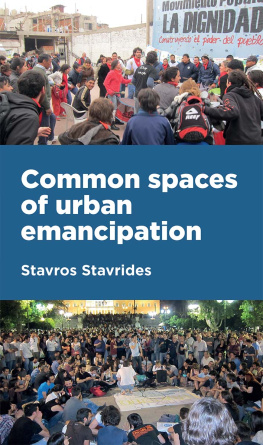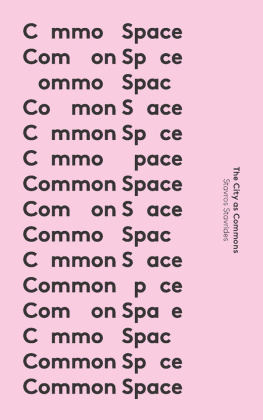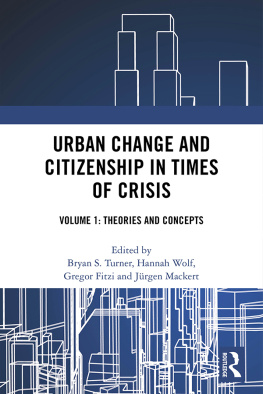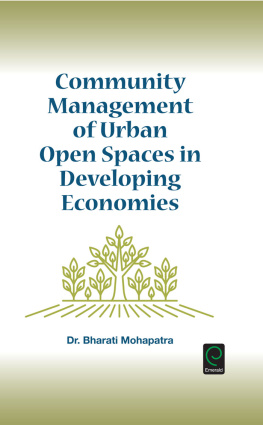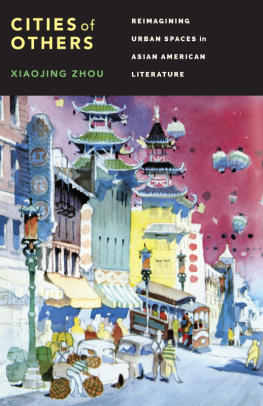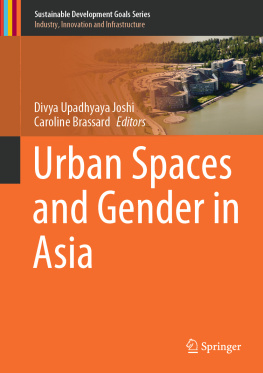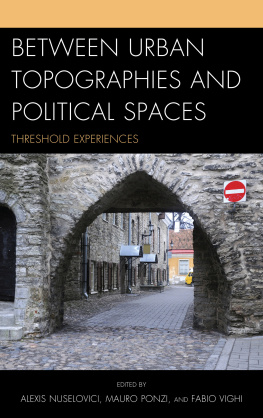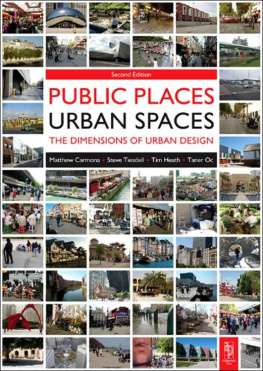Stavros Stavrides - Common Spaces of Urban Emancipation
Here you can read online Stavros Stavrides - Common Spaces of Urban Emancipation full text of the book (entire story) in english for free. Download pdf and epub, get meaning, cover and reviews about this ebook. year: 2019, publisher: Manchester University Press, genre: Religion. Description of the work, (preface) as well as reviews are available. Best literature library LitArk.com created for fans of good reading and offers a wide selection of genres:
Romance novel
Science fiction
Adventure
Detective
Science
History
Home and family
Prose
Art
Politics
Computer
Non-fiction
Religion
Business
Children
Humor
Choose a favorite category and find really read worthwhile books. Enjoy immersion in the world of imagination, feel the emotions of the characters or learn something new for yourself, make an fascinating discovery.
- Book:Common Spaces of Urban Emancipation
- Author:
- Publisher:Manchester University Press
- Genre:
- Year:2019
- Rating:3 / 5
- Favourites:Add to favourites
- Your mark:
- 60
- 1
- 2
- 3
- 4
- 5
Common Spaces of Urban Emancipation: summary, description and annotation
We offer to read an annotation, description, summary or preface (depends on what the author of the book "Common Spaces of Urban Emancipation" wrote himself). If you haven't found the necessary information about the book — write in the comments, we will try to find it.
Common Spaces of Urban Emancipation — read online for free the complete book (whole text) full work
Below is the text of the book, divided by pages. System saving the place of the last page read, allows you to conveniently read the book "Common Spaces of Urban Emancipation" online for free, without having to search again every time where you left off. Put a bookmark, and you can go to the page where you finished reading at any time.
Font size:
Interval:
Bookmark:

Common spaces of urban emancipation

Common spaces of urban emancipation
STAVROS STAVRIDES
Manchester University Press
Copyright Stavros Stavrides 2019
The right of Stavros Stavrides to be identified as the author of this work has been asserted by him in accordance with the Copyright, Designs and Patents Act 1988.
Published by Manchester University Press
Altrincham Street, Manchester M1 7JA
www.manchesteruniversitypress.co.uk
British Library Cataloguing-in-Publication Data
A catalogue record for this book is available from the British Library
ISBN 978 1 5261 3559 9 hardback
ISBN 978 1 5261 3560 5 paperback
First published 2019
The publisher has no responsibility for the persistence or accuracy of URLs for any external or third-party internet websites referred to in this book, and does not guarantee that any content on such websites is, or will remain, accurate or appropriate.
Typeset in Minion by
Servis Filmsetting Ltd, Stockport, Cheshire
To Evgenia and Zoe.
All images are the property of the author, except where noted.
This book explores contemporary urban experiences connected to practices of sharing and collaboration. Becoming part of a growing discussion on the cultural meaning and the politics of urban commons, it uses examples from Europe and Latin America to support the view that a world of mutual support and urban solidarity emerges today in, against, and beyond existing societies of inequality. In such a world, people experience the potentialities of emancipation activated by concrete forms of space commoning.
In the everydayness of self-organized neighborhoods, in the struggles for justice in occupied public spaces, in the emergence of territories in resistance (Zibechi ), and in dissident artistic practices of collaborative creation, collective inventiveness produces fragments of a better future.
Entering the discussion on the political meaning of struggles to preserve and expand the commons (De Angelis about social organization, and new patterns of collective experiences through which people actively shape such a future in and through inhabited spaces.
Thinking about social emancipation needs to be firmly grounded in the rich realities of struggle and counter-dominant ways of organizing social life that today produce alternatives to the existing geometries of power. This is why this book was developed through a careful participatory study of such emerging realities in different social contexts. This is an effort that by no means claims to be based on an exhaustive survey of relevant events throughout the world. However, the examples analyzed can be taken to be indicative of contemporary possibilities unfolding in a moment of globally interconnected dissident experiences.
Usually case studies are treated as areas of research in which major theoretical constructions are being tested. I strongly believe that theory needs to be produced by carefully learning from what people actually do and from what reflections they produce while challenging established dogmas by their actions. Thus, basing an argument on the words and ideas of established thinkers necessarily needs to be complemented (or questioned) by attentive reappraisals of the words and ideas of less distinguished or so-called anonymous people. Collective inventiveness is a major source of inspiration for this book. And a deep respect for all those people who contribute to such collective forms of creativity in search for a more just world seems to be a major motivating force behind it.
Part of the book includes interviews with crucial informants relating to each case being analyzed: Zeyno Perkunlu, a member of an activist group involved in the Istanbul Gezi Park occupation, in (Brigadas Populares, Belo Horizonte, Brazil) for their interviews, which crucially contributed to the development of the research material and arguments of this book. If emancipatory commoning necessarily includes and promotes many different voices, it is important to trace the way they articulate their views and to be able to follow their reasoning rather than only translating them to a general idea.
The arguments developed here were tested and reworked in the context of both academic and activist environments. It would be impossible to thank each and every one of those who have contributed to the grounding and elaboration of the ideas that unfold in this work. Among them, the students in the undergraduate and postgraduate courses I teach at NTUA have for many years been both my relentless critics and my valuable collaborators.
I feel that I should especially thank some of those whose criticism and remarks in differing discussion contexts have enriched my arguments and helped me in clarifying my theoretical scopes: Markus Bader, Joanna Braga, Yves Cabannes, Oriol Nello Colom, Massimo De Angelis, Lieven De Cauter, Gustavo Esteva, Begm zden Firat, Pascal Gielen, Mathias Heyden, John Holloway, Michael Janoschka, Maria Kopanari, Penny Koutrolikou, Socratis Stratis, Alessio Surian, Charis Tsavdaroglou, Carlos Vainer, and Raul Zibechi.
Special thanks to Thomas Dark of Manchester University Press, who has supported the books publishing in a very encouraging, as well as efficient, way.
Evgenia Michalopoulou and Zoe Stavrides Michalopoulou have been, as always, inspiring, supportive, and ready to criticize any of my theoretical arguments that appear to be attracted by academic elitism! They both know very well what I owe to them.
An earlier version of part of was published in N. Dockx and G. Pascal (eds) (2018), Exploring Commonism: A New Aesthetics of the Real (Amsterdam: Valiz) under the title The potentials of space commoning.
is a greatly reworked and extended version of the published text Toward an architecture of commoning, ASAP/Journal, vol. 1/1 (2016), 7794
space matters, published in Naked Punch, special issue 19/2017, 1216.
) Life after the squares: reflections on the consequences of the Occupy movements, Social Movement Studies, 16/1, 119151.
), Repensar Bonpastor: Teijendo historias urbanas de Barcelona desde el umbral de las Casas Baratas (Barcelona: Col.Lectiu Repensar Bonpastor), 453454.
includes a small part of my published text Toward an architecture of commoning, ASAP/Journal, vol. 1/1 (2016), 7794.
), Gemeingut Stadt (Berlin: neue Gesellschaft fuer bildende Kunst), 1460.
Commoning experience
What this work attempts to establish is a rethinking of the possibility of human emancipation through a rethinking of space: space considered both as a concrete social reality (city, house, public space, territory) and as a form, a pattern, which is employed, along with other forms, to establish and reproduce the contested meanings of social reality. Space is considered both the locus of experience and a powerful means for constructing thoughts on and representations of what exists. In terms of experience, space concretizes relations between actually existing people (singularities according to Paolo Virno we will return to this), which shape the horizon of the sensible. What Jacques Rancire actually suggests is that the distribution of the sensible is a socially regulated process which does not simply dominate thought (as in the ideological dressage established by relevant ideological apparatuses) but, crucially, experience, what is to be experienced. Experience may become a social fact only when it is shared, only when it is represented (expressed, narrated, shown through voluntary or involuntary body signs as, for example, in an exclamation or in a cry of anguish). Experience, then, is socially controlled through the distribution of the sensible because it is made a social fact through exchanges of actions and expressions between people. Although the distribution of the sensible tries to limit and arrange the field of possible experiences and thus cripple experience as potentiality, the social life of experiences is a process of sharing, which in principle may escape dominant classifications.
Font size:
Interval:
Bookmark:
Similar books «Common Spaces of Urban Emancipation»
Look at similar books to Common Spaces of Urban Emancipation. We have selected literature similar in name and meaning in the hope of providing readers with more options to find new, interesting, not yet read works.
Discussion, reviews of the book Common Spaces of Urban Emancipation and just readers' own opinions. Leave your comments, write what you think about the work, its meaning or the main characters. Specify what exactly you liked and what you didn't like, and why you think so.

